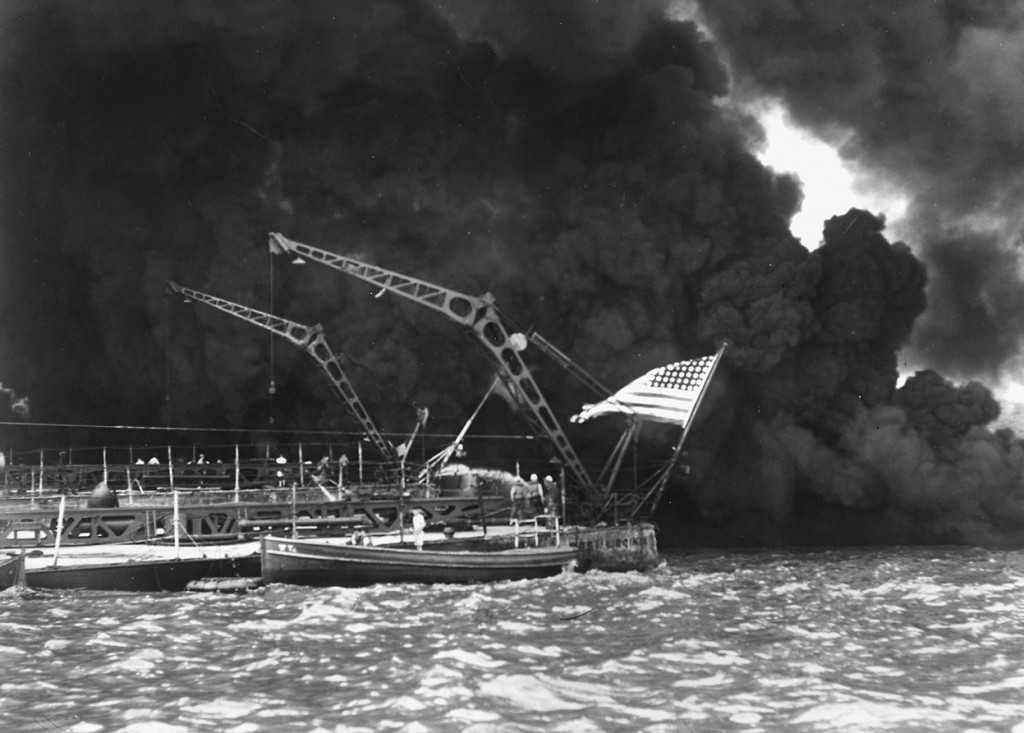False Impressions on the Day of Infamy September 10, 2014
Author: Beach Combing | in : Contemporary , trackbackAs all Americans and many non-Americans know, 7 Dec 1941, the day of infamy, was the date of a brilliantly planned and brilliantly executed Japanese attack on America’s most important Pacific base, Pearl Harbor. The attack was, for the Americans, a bolt from the blue. Yes, America’s leaders were aware that a Japanese assault was on the cards, and this simple fact had been passed on to American commanders in the Pacific theatre, including those at Pearl. But no one seems to have taken seriously the possibility of Japanese air power reaching Hawaii: the question of an air attack on the harbor was asked about, but always answered in the negative. Given this lack of preparedness among the higher echelons of the Pacific navy, it should come as no surprise that when the attack began men and women on the base and on those ships simply could not believe their eyes. They refused, in fact, in many cases, to register a raid and looked for all kinds of other innocent explanations as Japanese planes started on their killing runs. The attack began just before 7.50 AM and lasted for the best part of two hours. By ten o’clock only a handful of people in the environs of the harbor can have failed to have noticed that a foreign power had declared war: but in the first minutes, indeed, in the first hour, many were blissfully unaware while the bombs were falling, in some cases quite close to them. Enjoy some of these reactions from the first twenty minutes, most taken from Walter Lord’s classic study.
Commander Logan Ramsey was on Ford Island when a Japanese pilot dived down: he and another officer ran out to get the number of whatever young idiot had decided to pull off such a dangerous stunt.
Harry Mead was astounded that American planes were bombing a hangar: ‘Boy… is somebody going to catch it for putting live bombs on those planes’.
Frank Stock, a fireman on the Vestal was struck by how red discs had been painted on the attack planes to add realism in a military exercise.
A marine Roy Henry bet another Marine that it was the Army surprising the Navy with false torpedoes.
Harry Mead saw something drop from a plane and thought ‘some mechanic is going to catch hell for that’, as explosions began he asked himself why they were using live ammunition.
Sailors on the USS Sumner were struck by the army flying planes on a Sunday.
Joseph A. Pesek thought that the bombing was strange but assumed that the navy was out to destroy a target in the water.
A group watching on Ford Island saw the Navy practising with water bombs and when an oil tank exploded in flame one commented that the pilot would get in trouble. When a disc was spotted on the wing of a plane, meanwhile, another commented: ‘There goes one of the red team’.
Ensign George Shute holding up a warm bullet: ‘Some damn Army pilot has gone buster – he’s diving on BOQ and shooting!’
At John Rodgers airport: ‘Did you see those fools? They must be drunk, practising with live ammunition!’
Even in the hour after the attack began some Americans were remarkable relaxed. For example, at about nine o’clock, there were men still sunbathing on the ships in dry dock off to the side of the harbor!
Of course, all this is absolutely understandable and human, but it got Beach’s curiosity going. Other notable instances, please, from history of a refusal to understand a surprise event in the first minutes: drbeachcombing AT yahoo COM.



